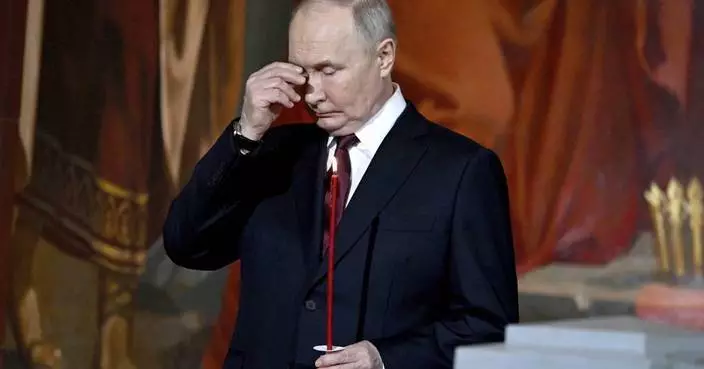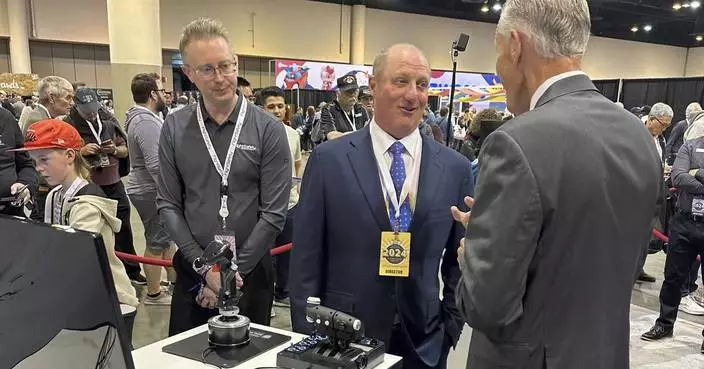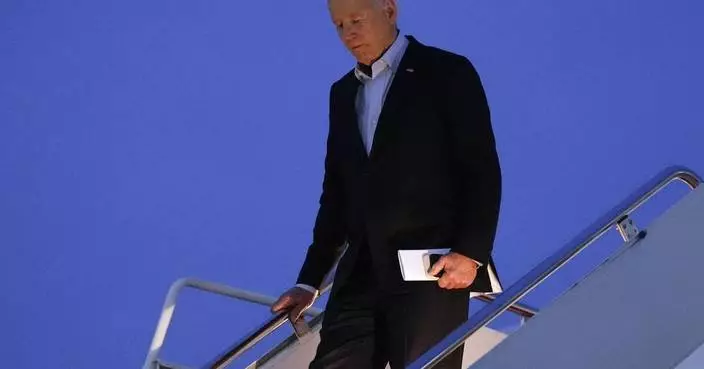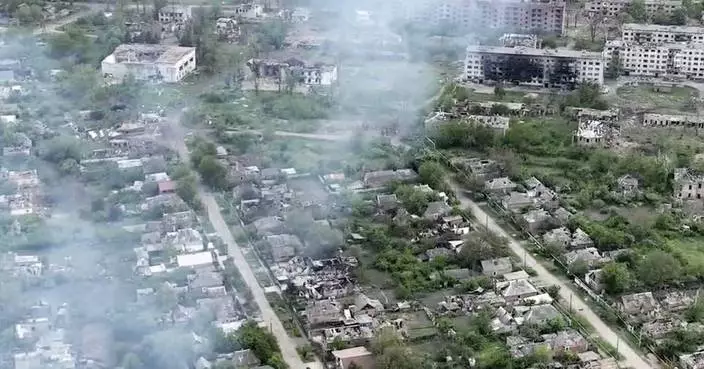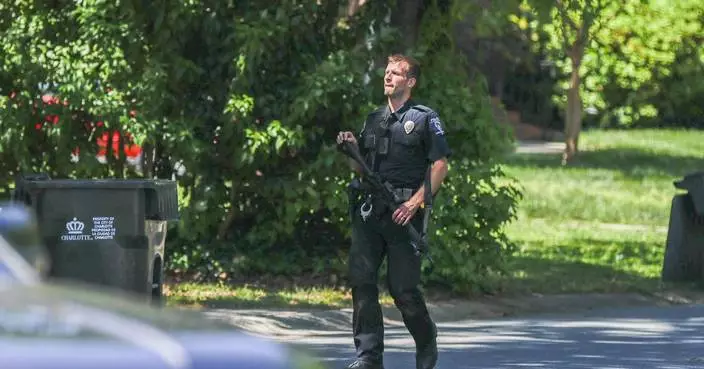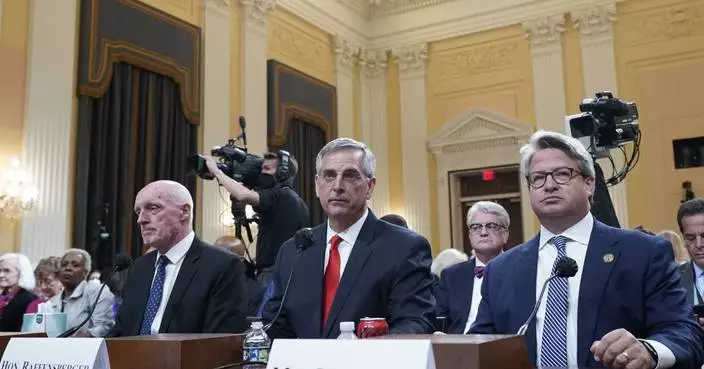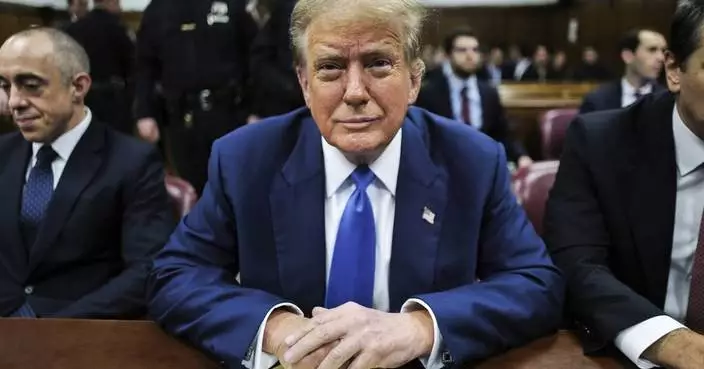The Russia collusion probe. The Stormy Daniels allegations. Escalating tension with Moscow.
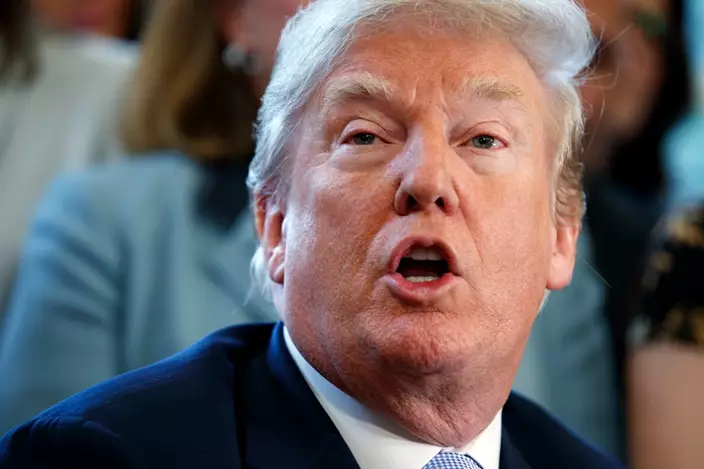
President Donald Trump speaks in the Oval Office at the White House before signing a new law aimed at curbing six trafficking Wednesday, April 11, 2018, in Washington. (AP Photo/Evan Vucci)
The tempests that have buffeted the White House for months merged into a maelstrom this week and threatened to engulf President Donald Trump, who on Wednesday railed against members of the Justice Department by name and used Twitter to threaten military strikes in Syria and taunt a nuclear-armed power.
While alarmed aides and allies worried that Trump was the angriest he'd ever been, the president saw conspiracies in the challenges facing his administration and hinted at more chaos. And as Trump's party was rocked by upheaval on Capitol Hill, White House staffers explored whether he has the legal authority to fire the men leading the investigation into his administration and, as underscored by the seizure of documents from his private lawyer, his business and personal life.
Trump pushed back Thursday on reports of disarray, insisted he did not consider firing special counsel Robert Mueller in December. The president denied a report in The New York Times, saying: "If I wanted to fire Robert Mueller in December, as reported by the Failing New York Times, I would have fired him. Just more Fake News from a biased newspaper!"
The Times reported that in early December, Trump was furious over reports about a new round of subpoenas from Muller's office and told advisers the investigation needed to be ended.
On Wednesday, Trump tweeted, "Much of the bad blood with Russia is caused by the Fake & Corrupt Russia Investigation, headed up by the all Democrat loyalists, or people that worked for Obama. Mueller is most conflicted of all (except Rosenstein who signed FISA & Comey letter). No Collusion, so they go crazy!"
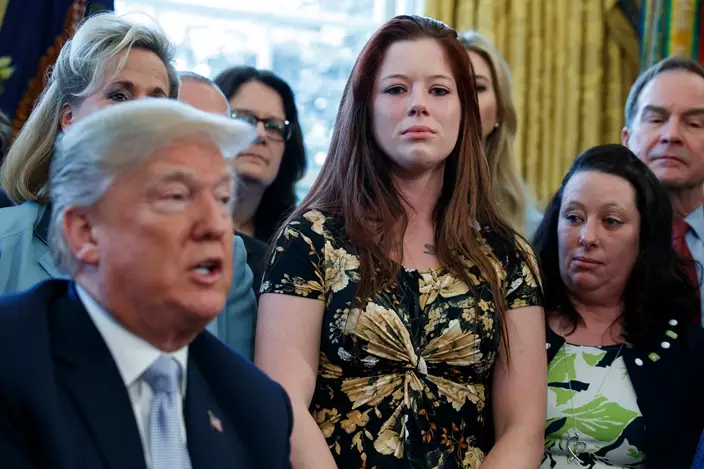
Victims of human trafficking, family members, and lawmakers listen as President Donald Trump speaks in the Oval Office at the White House before signing a new law aimed at curbing six trafficking Wednesday, April 11, 2018, in Washington. (AP Photo/Evan Vucci)
That message followed another provocative tweet, in which Trump laced into Russia for supporting Syrian President Bashar Assad, whose government is accused of launching an apparent chemical attack Saturday on its own people. Disregarding his own insistence that he would never tip his hand to military strategy, he seemed to suggest that he would launch airstrikes.
"Get ready Russia, because they will be coming, nice and new and 'smart!'" Trump wrote. "You shouldn't be partners with a Gas Killing Animal who kills his people and enjoys it!"
The president's renewed public anger at special counsel Robert Mueller and Deputy Attorney General Rob Rosenstein was prompted by the FBI raid on his longtime personal attorney Michael Cohen, who acknowledged paying $130,000 to Daniels, a porn actress, to buy her silence about an alleged affair with Trump. Trump has warned that an investigation into his business would cross "a red line" and could lead him to fire Mueller, despite strong pushback from a number of aides and Republicans in Congress.
"It worries me because I realize how much he feels personally cheated and how much it feels like it's a personal witch hunt. And he's not the kind of guy that takes that lying down. He fights back," said Newt Gingrich, the former House speaker and an informal Trump adviser. "I think Trump doesn't know how to deal with it and is very frustrated by it, thinks it's totally unfair. And that's what you're seeing."
White House press secretary Sarah Huckabee Sanders made clear Wednesday that Trump was wary of investigatory overreach, saying, "He has a very deep concern about the direction that the special counsel and other investigations have taken."
Although the president declared that his White House was "calm and calculated," aides said decisions happen fast and with even less warning than usual when Trump feels backed into a corner. Trump has continued to seethe about Attorney General Jeff Sessions recusing himself from the Russia probe. And a number of those close to Trump say they worry about his reaction — and the West Wing's lack of planning — to yet another storm on the horizon: the release of former FBI director James Comey's new book.
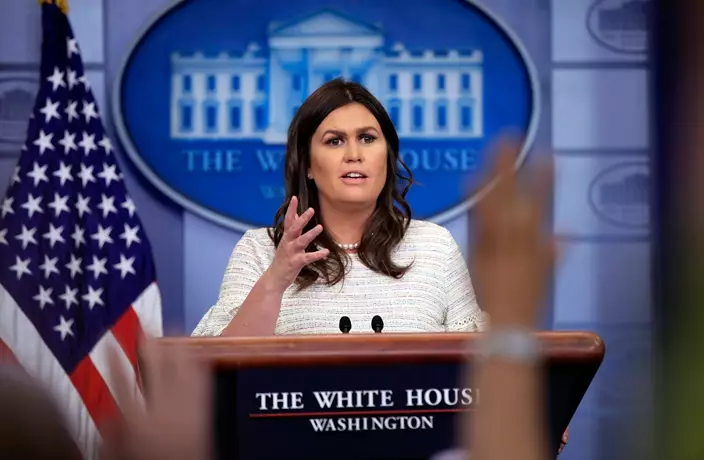
White House press secretary Sarah Huckabee Sanders talks to reporters during the daily press briefing in the Brady press briefing room at the White House, in Washington, Wednesday, April 11, 2018. (AP Photo/Manuel Balce Ceneta)
The advertisements for the interviews have begun blanketing cable news, leading Trump to angrily surmise that Comey was "going to lie" and try to "make money" by tarnishing the president's reputation, according to two people familiar with the president's thinking but not authorized to speak publicly about private discussions.
The January publication of Michael Wolff's "Fire & Fury" caught the White House off guard, and the critiques leveled by former chief strategist Steve Bannon and other ex-officials left Trump enraged. Although Comey's book comes as no surprise, the White House as of Wednesday had no formal plan to respond to it, instead likely opting to let the Republican National Committee and outside surrogates handle most of the pushback.
Trump's decision to fire Comey was the product of weeks of discussion among his senior-most staff. A similar debate is unlikely to play out over the potential dismissal of Mueller or Rosenstein — not least in part because those deliberations became a subject of Mueller's investigation of potential obstruction of justice.
But Trump, too, has grown more comfortable making decisions without seeking the counsel of his staff. That's what happened when he fired national security adviser H.R. McMaster and Secretary of State Rex Tillerson. Although both decisions had been expected for months, Trump acted first and left it to his staff to pick up the pieces.
While a number of allies believe Trump's talk on Mueller and Rosenstein was largely venting, they acknowledged that Trump is increasingly unpredictable. White House lawyers have been considering Trump's authority to circumvent Department of Justice regulations and unilaterally fire Mueller. Trump could also direct Rosenstein or a potential successor to take action against Mueller.
Republican Rep. Mark Meadows, a Trump ally, said he did not expect a purge.
"The president is not talking about firing Mueller. I've had conversations with the president, and he's not talking about it," Meadows said.
Bipartisan legislation to protect the special counsel was introduced Wednesday, but its fate was uncertain.
White House aides also worried about the surprise announcement from House Speaker Paul Ryan that he will leave Congress at the end of the year. The move was interpreted by some in Trump's orbit as an acknowledgement of the rising likelihood that Democrats could gain control of the House this fall, imperiling the president's agenda and potentially sparking talk of impeachment.
Just a few months short of a quarter-century as Russia's leader, Vladimir Putin on Tuesday will put his hand on a copy of the constitution and begin another six-year term as president wielding extraordinary power.
Since becoming acting president on the last day of 1999, Putin has shaped Russia into a monolith — crushing political opposition, running independent-minded journalists out of the country and promoting an increasing devotion to prudish “traditional values” that pushes many in society into the margins.
His influence is so dominant that other officials could only stand submissively on the sidelines as he launched a war in Ukraine despite expectations the invasion would bring international opprobrium and harsh economic sanctions, as well as cost Russia dearly in the blood of its soldiers.
With that level of power, what Putin will do with his next term is a daunting question at home and abroad.
The war in Ukraine, where Russia is making incremental though consistent battlefield gains, is the top concern, and he is showing no indication of changing course.
“The war in Ukraine is central to his current political project, and I don't see anything to suggest that that will change. And that affects everything else,” Brian Taylor, a Syracuse University professor and author of “The Code of Putinism,” said in an interview with The Associated Press.
“It affects who's in what positions, it affects what resources are available and it affects the economy, affects the level of repression internally,” he said.
In his state of the nation address in February, Putin vowed to fulfill Moscow’s goals in Ukraine, and do whatever it takes to “defend our sovereignty and security of our citizens.” He claimed the Russian military has “gained a huge combat experience” and is “firmly holding the initiative and waging offensives in a number of sectors.”
That will come at huge expense, which could drain money available for the extensive domestic projects and reforms in education, welfare and poverty-fighting that Putin used much of the two-hour address to detail.
Taylor suggested such projects were included in the address as much for show as for indicating real intent to put them into action.
Putin “thinks of himself in the grand historical terms of Russian lands, bringing Ukraine back to where it belongs, those sorts of ideas. And I think those trump any kind of more socioeconomic-type programs,” Taylor said.
If the war were to end in less than total defeat for either side, with Russia retaining some of the territory it has already captured, European countries fear that Putin could be encouraged toward further military adventurism in the Baltics or in Poland.
“It's possible that Putin does have vast ambitions and will try to follow a costly success in Ukraine with a new attack somewhere else,” Harvard international relations professor Stephen Walt wrote in the journal Foreign Policy. “But it is also entirely possible that his ambitions do not extend beyond what Russia has won — at enormous cost and that he has no need or desire to gamble for more.”
But, Walt added, “Russia will be in no shape to launch new wars of aggression when the war in Ukraine is finally over.”
Such a rational concern might not prevail, others say. Maksim Samorukov, of the Carnegie Russia Eurasia Center, said that “driven by Putin's whims and delusions, Moscow is likely to commit self-defeating blunders.”
In a commentary in Foreign Affairs, Samorukov suggested that Putin's age could affect his judgment.
“At 71 ... his awareness of his own mortality surely impinges on his decision-making. A growing sense of his limited time undoubtedly contributed to his fateful decision to invade Ukraine.”
Overall, Putin may be heading into his new term with a weaker grip on power than he appears to have.
Russia's “vulnerabilities are hidden in plain sight. Now more than ever, the Kremlin makes decisions in a personalized and arbitrary way that lacks even basic controls,” Samorukov wrote.
“The Russian political elite have grown more pliant in implementing Putin's orders and more obsequious to his paranoid worldview,” he wrote. The regime “is at permanent risk of crumbling overnight, as its Soviet predecessor did three decades ago."
Putin is sure to continue his continue animosity toward the West, which he said in his state of the nation address “would like to do to Russia the same thing they did in many other regions of the world, including Ukraine: to bring discord into our home, to weaken it from within.”
Putin's resistance to the West manifests not only anger at its support for Ukraine, but in what he sees as the undermining of Russia's moral fiber.
Russia last year banned the notional LGBTQ+ “movement” by declaring it to be extremist in what officials said was a fight for traditional values like those espoused by the Russian Orthodox Church in the face of Western influence. Courts also banned gender transitioning.
“I would expect the role of the Russian Orthodox Church to continue to be quite visible," Taylor said. He also noted the burst of social media outrage that followed a party hosted by TV presenter Anastasia Ivleeva where guests were invited to show up “almost naked.”
“Other actors in the system understand that that stuff resonates with Putin. ... There were people interested in exploiting things like that,” he said.
Although the opposition and independent media have almost vanished under Putin's repressive measures, there's still potential for further moves to control Russia's information space, including moving forward with its efforts to establish a “sovereign internet.”
The inauguration comes two days before Victory Day, Russia's most important secular holiday, commemorating the Soviet Red Army's capture of Berlin in World War II and the immense hardships of the war, in which the USSR lost some 20 million people.
The defeat of Nazi Germany is integral to modern Russia's identity and to Putin's justification of the war in Ukraine as a comparable struggle.
Associated Press writer Jim Heintz, based in Tallinn, Estonia, has covered the entirety of Putin's tenure as Russian leader.
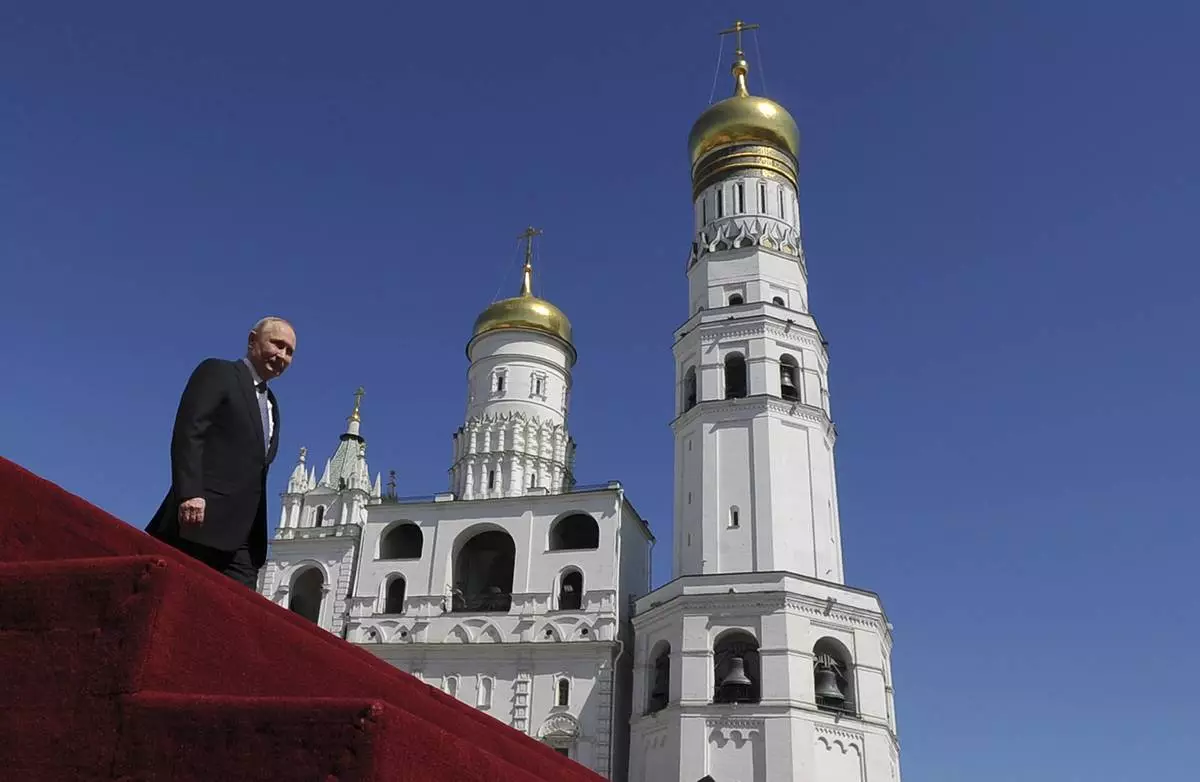
FILE - President Vladimir Putin looks at a military parade after his inauguration ceremony in Moscow on May 7, 2018. Putin begins another term as Russian president in an opulent Kremlin inauguration taking place on Tuesday. (Dmitry Azarov, Sputnik, Kremlin Pool Photo via AP, File)
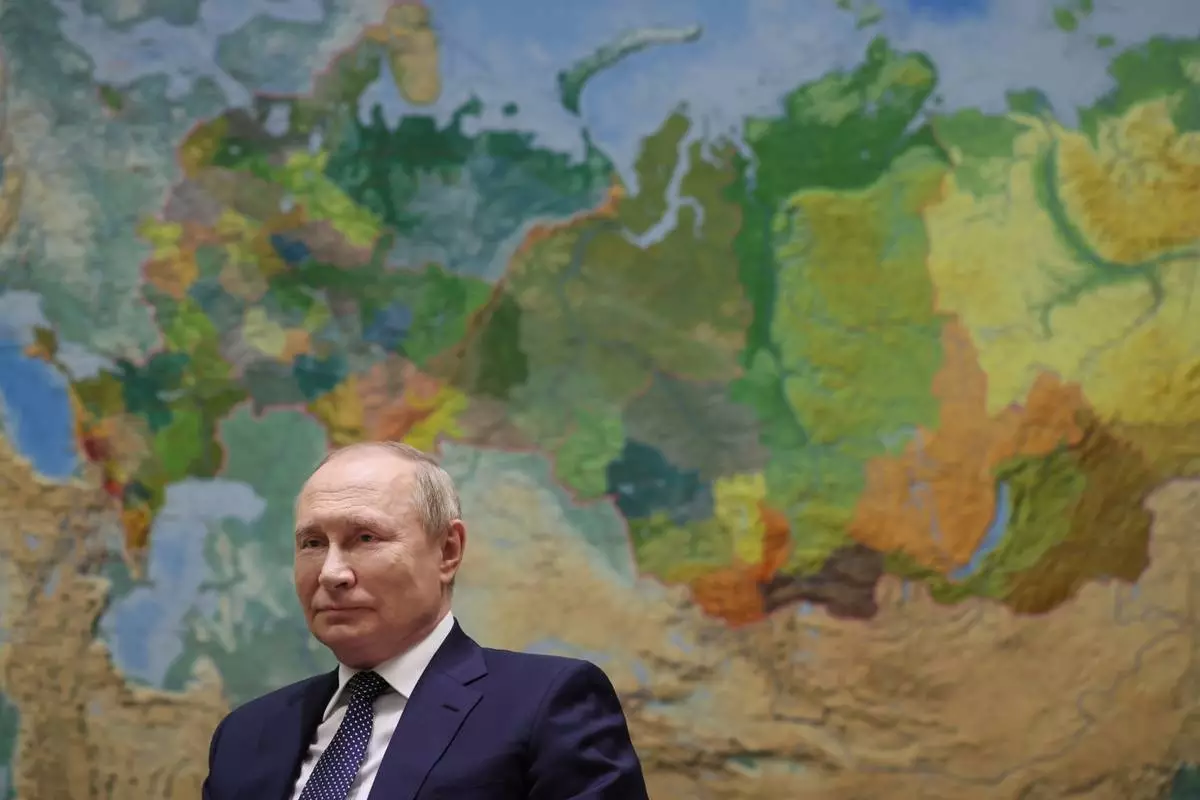
FILE - Russian President Vladimir Putin sits for an interview with the Russia-1 TV channel in the Bocharov Ruchei residence in the Black Sea resort of Sochi, Russia, on June 3, 2022. (Mikhail Metzel, Sputnik, Kremlin Pool Photo via AP, File)
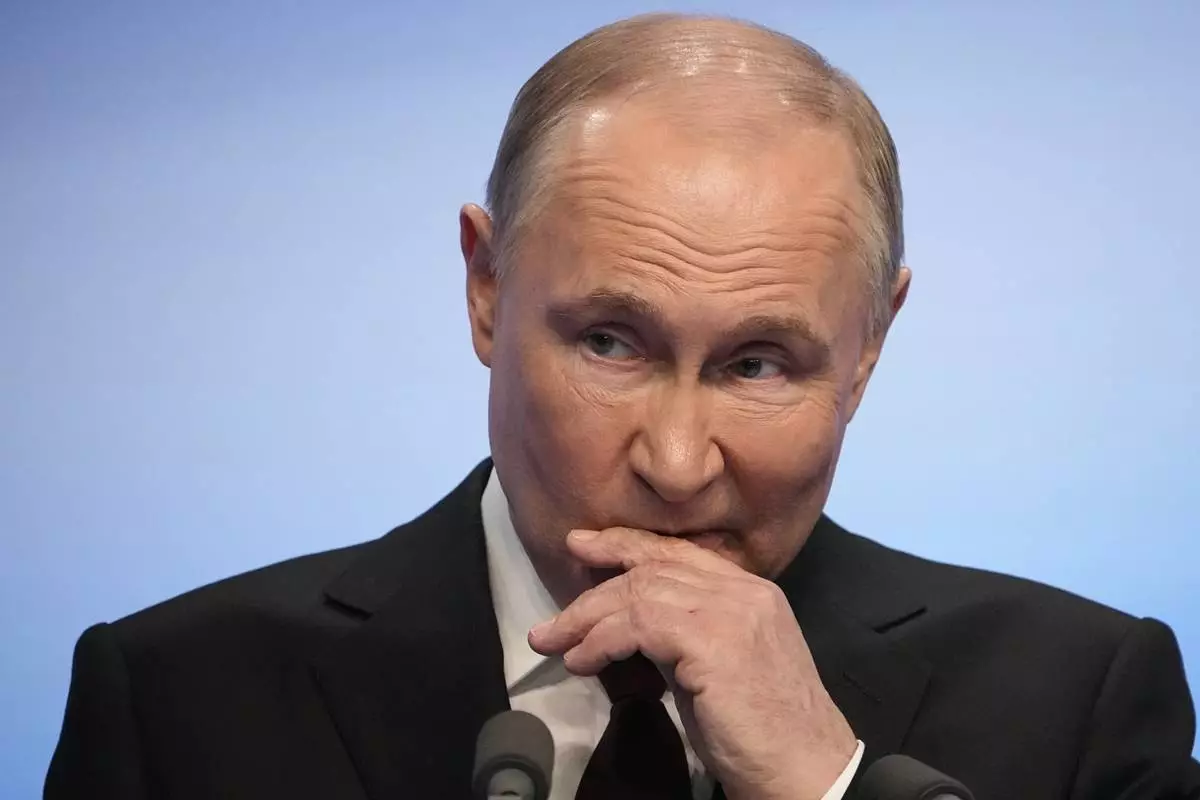
FILE - Russian President Vladimir Putin speaks during a visit to his campaign headquarters after the presidential election in Moscow on March 18, 2024. Putin begins his fifth term as Russian president in an opulent Kremlin inauguration on Tuesday after destroying his political opposition, launching a devastating war in Ukraine and consolidating power. (AP Photo, File)
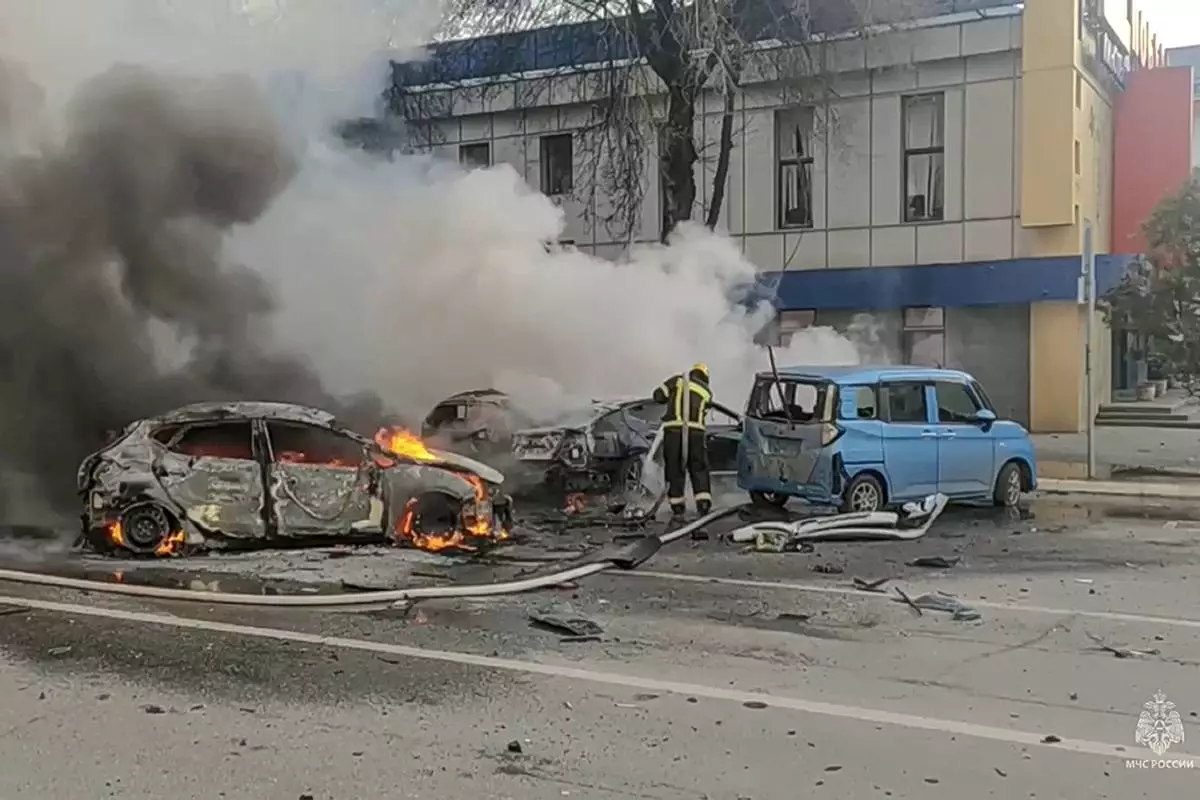
FILE - In this photo taken from video released by Russia’s Emergency Situations Ministry on Dec. 30, 2023, firefighters extinguish burning cars after shelling in Belgorod, Russia. Russian President Vladimir Putin, who begins another 6-year term on Tuesday, launched a war in Ukraine despite expectations the invasion would bring international opprobrium and harsh economic sanctions, as well as cost Russia dearly in the blood of its soldiers. (Russia Emergency Situations Ministry telegram channel via AP, File)
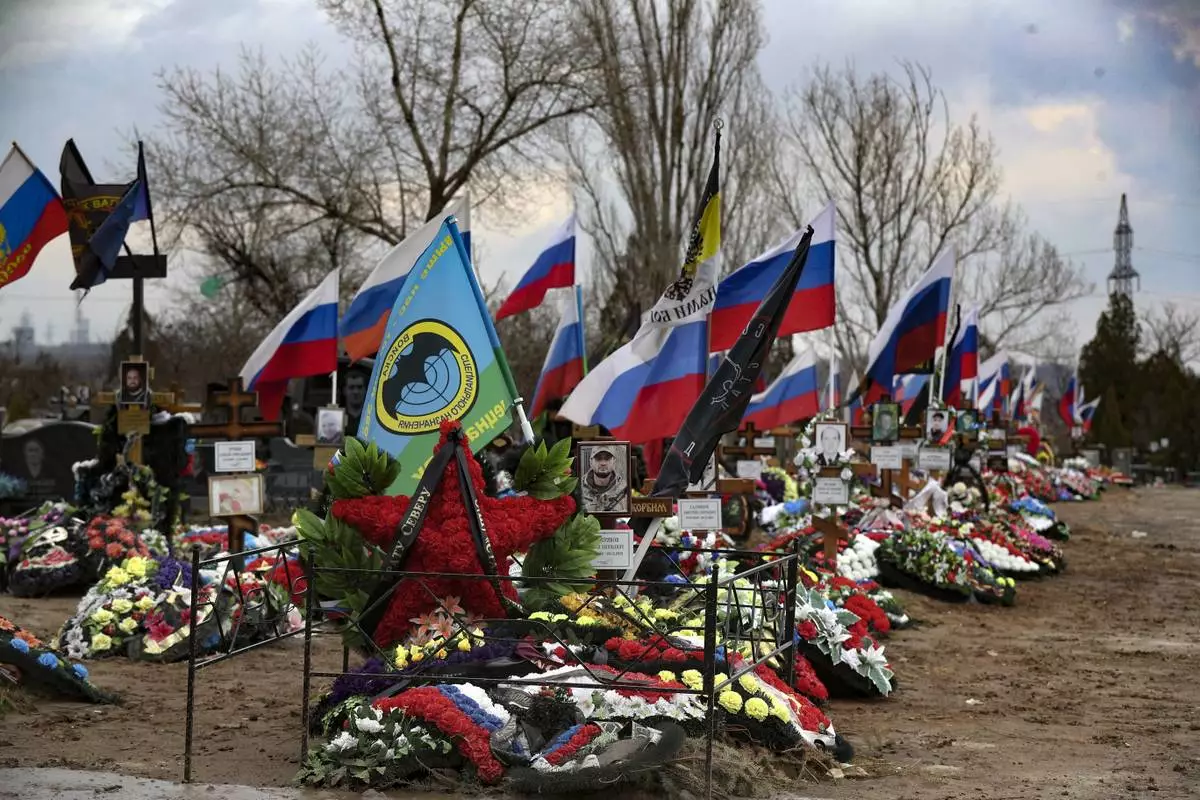
Graves of Russian servicemen killed in Ukraine in a cemetery in Russia’s Volgograd region on Saturday, March 30, 2024. Russian president Vladimir Putin’s influence is so dominant that other officials could only stand by submissively as he launched a war in Ukraine despite expectations the invasion would bring international opprobrium and harsh economic sanctions, as well as cost Russia dearly in the blood of its soldiers. (AP Photo)
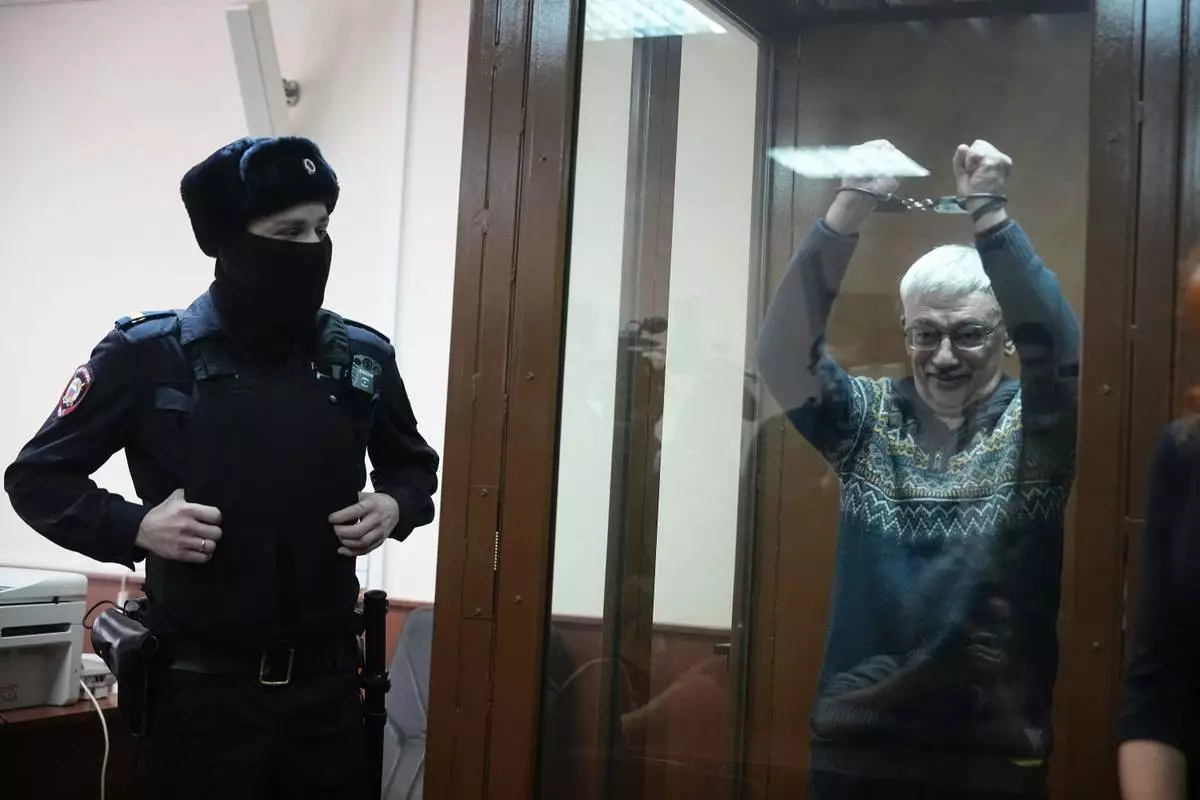
FILE - Oleg Orlov, co-chair of the Nobel Peace Prize-winning organization Memorial, gestures from a glass cage while on trial on charges of repeated discrediting the Russian military, in Moscow on Feb. 27, 2024. Orlov was sentenced to 2 1/2 years in prison. (AP Photo, File)
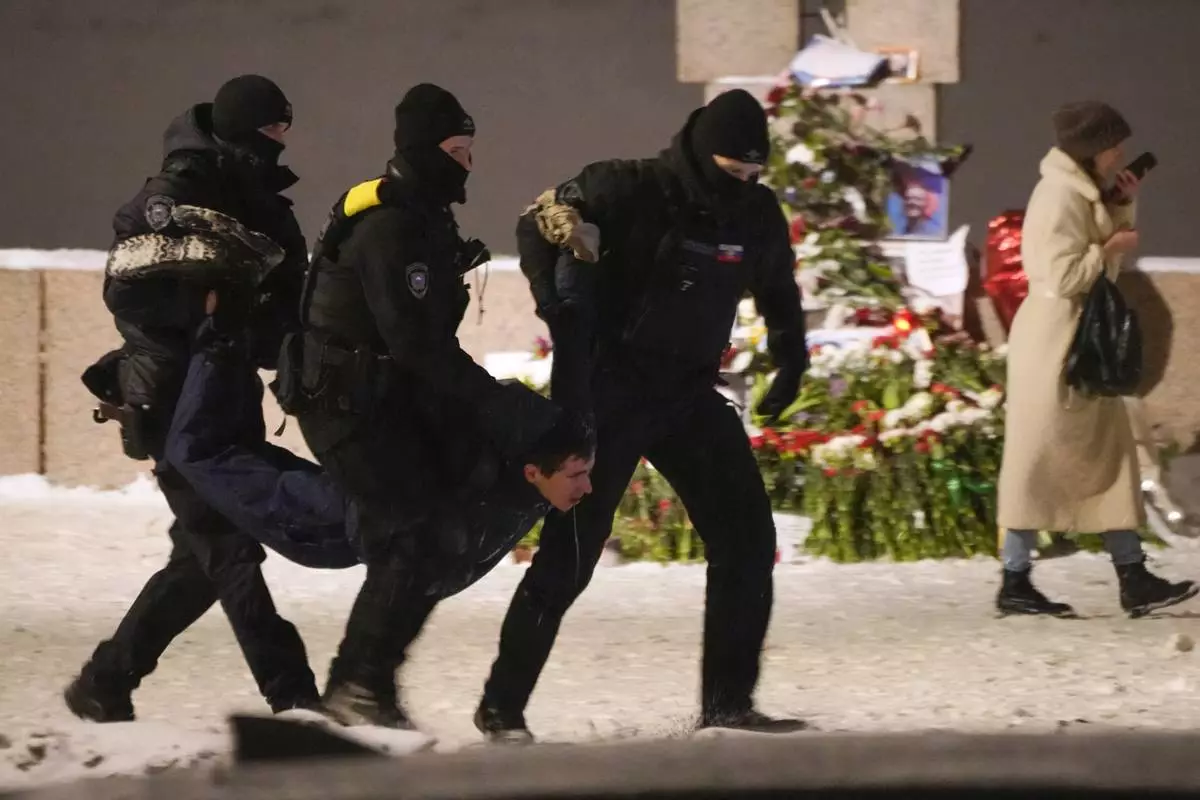
FILE - Police officers detain a man laying flowers to honor Alexei Navalny at a monument to victims of Soviet repression in St. Petersburg, Russia, on Feb. 16, 2024. (AP Photo, File)

FILE - In this photo released by the Russian Defense Ministry on March 19, 2024, a Russian tank fires at Ukrainian troops from a position near the border with Ukraine in Russia’s Belgorod region. (Russian Defense Ministry Press Service via AP, File)
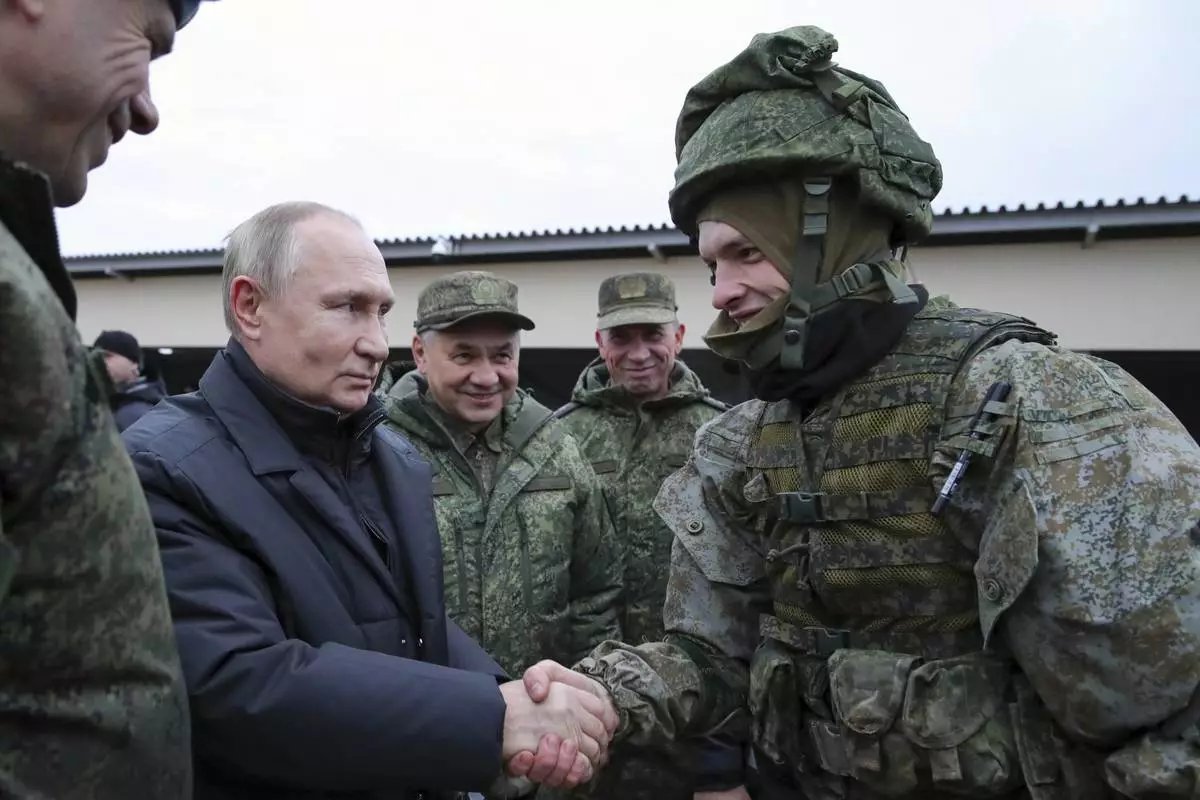
FILE - Russian President Vladimir Putin shakes hands with a soldier and Russian Defense Minister Sergei Shoigu stands next to him, smiling, during a visit at a military training centre of the Western Military District in Ryazan Region, Russia on Oct. 20, 2022. Putin begins his fifth term as Russian president in an opulent Kremlin inauguration on Tuesday after destroying his political opposition, launching a devastating war in Ukraine and consolidating power. (Mikhail Klimentyev, Sputnik, Kremlin Pool Photo via AP, File)
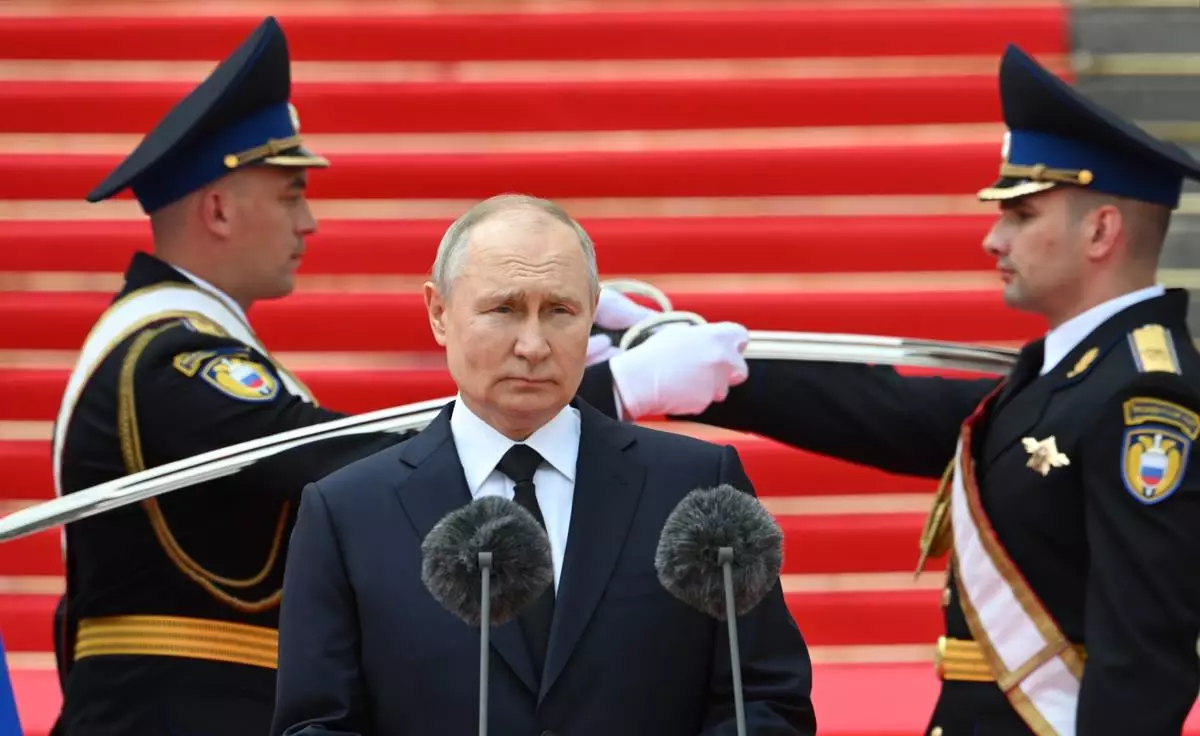
FILE - Russian President Vladimir Putin addresses members of the Defense Ministry, the National Guard, the Interior Ministry, the Federal Security Service and the Federal Guard Service at the Kremlin, in Moscow on June 27, 2023. Putin will begins his fifth term as Russian president in an opulent Kremlin inauguration on Tuesday after destroying his political opposition, launching a devastating war in Ukraine and consolidating power. (Sergei Guneyev, Sputnik, Kremlin Pool Photo via AP, File)
















